How a Small-Time Soccer Team Draws a Crowd: With Its Activism
The New York Times (archive.ph)
By Rory Smith
2024-03-02 05:01:27GMT

Causes and cheers exist side by side in the stands at Bohemian F.C.Credit...Paulo Nunes dos Santos for The New York Times
In the back room of the threadbare offices of the Irish soccer team Bohemians, the printer clunks and chugs and whirs incessantly, spitting out a cascade of shipping labels. Some of the addresses bear the names of nearby Dublin streets. Others are from farther afield: across Ireland, across the Irish Sea, across the Atlantic.
Each label will be affixed to a package containing a Bohemians jersey. And these days, the club sells a lot of jerseys.
The appeal is not rooted in any of the traditional drivers of soccer’s merchandise market: success, glamour, a beloved star player. Daniel Lambert, the club’s chief operating officer, loves both Bohemians and the League of Ireland, the competition in which it plays, but he is under no illusions about the reality of either. “We’re a small team in a poor league,” he said.
Instead, fans are drawn to Bohemians by the jerseys themselves; or, rather, what the jerseys say, both about the team and the customer.
Some recent editions have drawn on the cultural iconography of Dublin: the Poolbeg cooling towers; the pattern from the city’s bus seats; the face of Phil Lynott, former frontman of the band Thin Lizzy. Others send a more explicit message: One of this season’s efforts has been designed in the colors of the Palestinian flag. A couple of years ago, another bore the slogan “Refugees Welcome.”
In a studiously apolitical sport, where most teams avoid staking out positions except on the safest of ground — and at a time when Ireland is trying to douse the sparks of a flickering culture war — that makes Bohemians an enthusiastic, unabashed outlier: a rare example of a soccer club willing to wear its values on its sleeve, its torso and any other surface it can find.
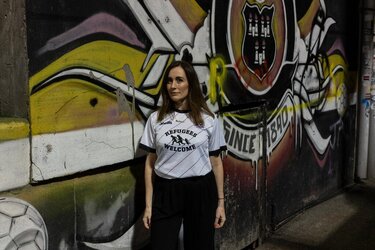
A fan in a popular Bohemian F.C. jersey. Other versions have celebrated local bands and humanitarian causes.Credit...Paulo Nunes dos Santos for The New York Times
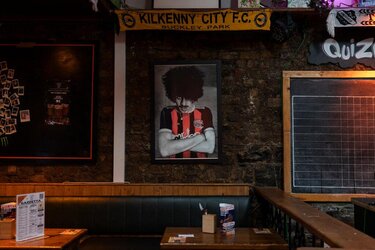
A painting of Phil Lynott, former frontman of the band Thin Lizzy, in a Bohemians jersey. Another version honors Bob Marley.Credit...Paulo Nunes dos Santos for The New York Times
At Dalymount Park, Bohemians’ tumbledown home, the corner flags bear the rainbow colors of the Pride movement. Fans walk the concourses in scarves bearing both the club crest and the Palestinian colors. Corrugated iron walls are decorated with images of Che Guevara and the Venezuelan flag.
Behind one section, home to the most boisterous of the club’s supporters, a fist rises against a red-and-black background. “Love football, hate racism,” it reads.
It has been placed there quite deliberately. Bohemians might lean, unapologetically, to the left, but the club has been more than willing to harness distinctly capitalist marketing strategies to amplify its reach. “The politics are absolutely sincere,” Dion Fanning, a writer, author and co-host of the podcast Free State, said. “But the way they do it is very clever.”
Much of that can be attributed to Mr. Lambert’s background in music. He thinks, essentially and habitually, like a promoter. “It’s in that section that younger fans are taking selfies and uploading them to Instagram,” Mr. Lambert said. “This way they have that message in there, too.”
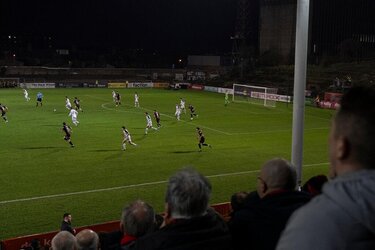
A match between Bohemians and Sligo Rovers at Dalymount Park in February.Credit...Paulo Nunes dos Santos for The New York Times
It is hard to argue that the approach is not working. Bohemians’ appeal now stretches far beyond its traditional base in the north Dublin suburb of Phibsborough. It has captured the hearts and minds of a congregation of fans across the world, diffused by geography but united — in Mr. Lambert’s eyes — by common priorities.
Bohemians attracts fans, he said, who are “socially conscious, concerned about what has happened to the game, uncomfortable with state actors being in charge of these precious things that belong to the working class.”
There are enough of them that Bohemians now stands as a remarkable commercial success story. A little more than a decade ago, the club stood on the verge of a first-ever relegation from the top tier of Irish soccer and the brink of financial oblivion. Now, it is a picture of health. In 2015, the club had only 530 members. That figure now stands at 3,000. “With a waiting list,” Mr. Lambert noted.
There are 10 teams in the League of Ireland, yet Bohemians accounts for a quarter of the league’s commercial revenue. The club’s merchandise sales alone have soared by 2,000 percent in a decade. The orders for jerseys that pour in every day are not just for the newest versions, either; old editions continue to sell well, something Mr. Lambert attributes to the fact that they are not ephemeral fashion items. “They tell a story,” he said.

Murals supporting various causes form the backdrop at Bohemians. The approach is not universally popular.Credit...Paulo Nunes dos Santos for The New York Times
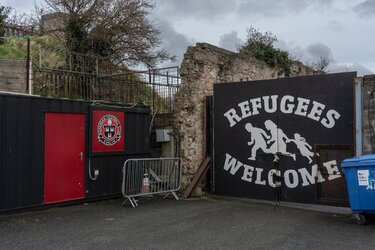
Bohemians does not see the positions it takes as inherently political. To the club, they are humanitarian issues.Credit...Paulo Nunes dos Santos for The New York Times
That story, and the club’s rise alongside it, has not always been universally popular. Mr. Lambert conceded that some Bohemians fans may have been put off by the club’s activism — on subjects as diverse as gay marriage, climate justice and the ending of what he terms Ireland’s “inhumane” handling of asylum seekers — and he has long detected a low-grade grumbling among supporters of rival teams.
It is, after all, fair to say that very few soccer teams have an in-house poet, or host halftime raves, or employ four members of staff devoted to establishing a climate strategy. “We’ve heard it all: the hipster club, a load of gimmicks,” Mr. Lambert said. “You do hear people say: ‘Why can’t Bohs just be normal?’”
The answer to that, Mr. Lambert said, is simple. Bohemians does not see the positions it takes as inherently political. To the club, they are humanitarian issues, the natural values of a team owned not by a private investor but by its fans. And expressing them, he and others said, is more pressing than ever, as Ireland’s incipient far right grows in both strength and volume.
“There is something at stake now,” said Mr. Fanning, the podcast host. “A few years ago, when Bohemians started doing this, you would have said Ireland would never have a far right. Now, it is still several levels below a subculture, but it is there, and it will get bigger.”
That, Mr. Lambert said, is what makes the decision to bind the club to its beliefs even more important. “The purpose of a club is to be a force for good,” he said. “I think people are quite often desensitized to a lot of these issues. You can use sport to bring them to people’s attention, to engage with them, to put pressure on governments to address them. Sport has an obligation to do that.”
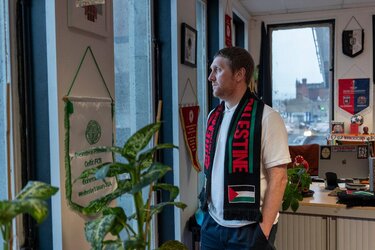
Daniel Lambert, the Bohemians chief executive. The club, he says, attracts fans who are “socially conscious” and “uncomfortable with state actors being in charge of these precious things that belong to the working class.”Credit...Paulo Nunes dos Santos for The New York Times
As much as Bohemians’ activism is rooted in its beliefs, though, it has also been good for business. Crowds across the League of Ireland have grown in recent years — the precise cause of that phenomenon is hotly debated — but tickets for Bohemians games are now particularly precious possessions.
Mary Nolan, who has been attending games with her father since she was a child, said, “You see more women, more kids, more families.”
“There’s still a few old men who moan that none of the newcomers know anything about football, but it’s generally a very welcoming space now,” she added. “Far more people have been drawn in than put off by the politics.”
And even those fans who might not naturally be inclined to see a soccer team as the correct vehicle for social justice have little reason to complain. There is no wealthy private benefactor to write the checks. There is no generous television deal. Transfer fees for selling player to larger leagues are unreliable and often measly.
The club’s messaging, and its willingness to take stands, puts Bohemians in a “far stronger position,” as Mr. Lambert put it. It helps to finance all the work the club does off the field, and helps to pay for the team that plays on it.
“My dad is naturally very liberal,” Ms. Nolan said. “He knows these causes matter. But he also understands, at the very least, that they help to sell a lot of jerseys.”

Bohemians fans before a game in February.Credit...Paulo Nunes dos Santos for The New York Times

The club ships jerseys to fans around the world.Credit...Paulo Nunes dos Santos for The New York Times
As long as that continues, there seems to be no reason for anyone to object. “When I was a kid and a young man there was no contradiction between loving books and loving football,” Roddy Doyle, the novelist and a lifelong Bohemians fan, wrote in an email. “They were all cultural choices we made, our badges of identity.”
He added: “Bohemians come close to delivering that blend that has always been my idea of culture: a stadium in an area that crackles with history and is also a magnet for newness; a team that wears jerseys that feature Dublin musicians and have ‘Refugees Welcome’ printed across their chests; fans who sing a song composed by Brendan Behan just before kickoff. Supporting Bohemians is a stew. But the football is vital.”
For all the causes, the activism, the growth and the commercial success, Mr. Doyle wrote, the best part of being a Bohemians fan to him is the same as it has always been: “Being in the crowd when they score.”

The Bohemians crowd. As much as the club’s activism is rooted in its beliefs, it has also been good for business; tickets for games have become precious possessions.Credit...Paulo Nunes dos Santos for The New York Times
The New York Times (archive.ph)
By Rory Smith
2024-03-02 05:01:27GMT

Causes and cheers exist side by side in the stands at Bohemian F.C.Credit...Paulo Nunes dos Santos for The New York Times
In the back room of the threadbare offices of the Irish soccer team Bohemians, the printer clunks and chugs and whirs incessantly, spitting out a cascade of shipping labels. Some of the addresses bear the names of nearby Dublin streets. Others are from farther afield: across Ireland, across the Irish Sea, across the Atlantic.
Each label will be affixed to a package containing a Bohemians jersey. And these days, the club sells a lot of jerseys.
The appeal is not rooted in any of the traditional drivers of soccer’s merchandise market: success, glamour, a beloved star player. Daniel Lambert, the club’s chief operating officer, loves both Bohemians and the League of Ireland, the competition in which it plays, but he is under no illusions about the reality of either. “We’re a small team in a poor league,” he said.
Instead, fans are drawn to Bohemians by the jerseys themselves; or, rather, what the jerseys say, both about the team and the customer.
Some recent editions have drawn on the cultural iconography of Dublin: the Poolbeg cooling towers; the pattern from the city’s bus seats; the face of Phil Lynott, former frontman of the band Thin Lizzy. Others send a more explicit message: One of this season’s efforts has been designed in the colors of the Palestinian flag. A couple of years ago, another bore the slogan “Refugees Welcome.”
In a studiously apolitical sport, where most teams avoid staking out positions except on the safest of ground — and at a time when Ireland is trying to douse the sparks of a flickering culture war — that makes Bohemians an enthusiastic, unabashed outlier: a rare example of a soccer club willing to wear its values on its sleeve, its torso and any other surface it can find.

A fan in a popular Bohemian F.C. jersey. Other versions have celebrated local bands and humanitarian causes.Credit...Paulo Nunes dos Santos for The New York Times

A painting of Phil Lynott, former frontman of the band Thin Lizzy, in a Bohemians jersey. Another version honors Bob Marley.Credit...Paulo Nunes dos Santos for The New York Times
At Dalymount Park, Bohemians’ tumbledown home, the corner flags bear the rainbow colors of the Pride movement. Fans walk the concourses in scarves bearing both the club crest and the Palestinian colors. Corrugated iron walls are decorated with images of Che Guevara and the Venezuelan flag.
Behind one section, home to the most boisterous of the club’s supporters, a fist rises against a red-and-black background. “Love football, hate racism,” it reads.
It has been placed there quite deliberately. Bohemians might lean, unapologetically, to the left, but the club has been more than willing to harness distinctly capitalist marketing strategies to amplify its reach. “The politics are absolutely sincere,” Dion Fanning, a writer, author and co-host of the podcast Free State, said. “But the way they do it is very clever.”
Much of that can be attributed to Mr. Lambert’s background in music. He thinks, essentially and habitually, like a promoter. “It’s in that section that younger fans are taking selfies and uploading them to Instagram,” Mr. Lambert said. “This way they have that message in there, too.”

A match between Bohemians and Sligo Rovers at Dalymount Park in February.Credit...Paulo Nunes dos Santos for The New York Times
It is hard to argue that the approach is not working. Bohemians’ appeal now stretches far beyond its traditional base in the north Dublin suburb of Phibsborough. It has captured the hearts and minds of a congregation of fans across the world, diffused by geography but united — in Mr. Lambert’s eyes — by common priorities.
Bohemians attracts fans, he said, who are “socially conscious, concerned about what has happened to the game, uncomfortable with state actors being in charge of these precious things that belong to the working class.”
There are enough of them that Bohemians now stands as a remarkable commercial success story. A little more than a decade ago, the club stood on the verge of a first-ever relegation from the top tier of Irish soccer and the brink of financial oblivion. Now, it is a picture of health. In 2015, the club had only 530 members. That figure now stands at 3,000. “With a waiting list,” Mr. Lambert noted.
There are 10 teams in the League of Ireland, yet Bohemians accounts for a quarter of the league’s commercial revenue. The club’s merchandise sales alone have soared by 2,000 percent in a decade. The orders for jerseys that pour in every day are not just for the newest versions, either; old editions continue to sell well, something Mr. Lambert attributes to the fact that they are not ephemeral fashion items. “They tell a story,” he said.

Murals supporting various causes form the backdrop at Bohemians. The approach is not universally popular.Credit...Paulo Nunes dos Santos for The New York Times

Bohemians does not see the positions it takes as inherently political. To the club, they are humanitarian issues.Credit...Paulo Nunes dos Santos for The New York Times
That story, and the club’s rise alongside it, has not always been universally popular. Mr. Lambert conceded that some Bohemians fans may have been put off by the club’s activism — on subjects as diverse as gay marriage, climate justice and the ending of what he terms Ireland’s “inhumane” handling of asylum seekers — and he has long detected a low-grade grumbling among supporters of rival teams.
It is, after all, fair to say that very few soccer teams have an in-house poet, or host halftime raves, or employ four members of staff devoted to establishing a climate strategy. “We’ve heard it all: the hipster club, a load of gimmicks,” Mr. Lambert said. “You do hear people say: ‘Why can’t Bohs just be normal?’”
The answer to that, Mr. Lambert said, is simple. Bohemians does not see the positions it takes as inherently political. To the club, they are humanitarian issues, the natural values of a team owned not by a private investor but by its fans. And expressing them, he and others said, is more pressing than ever, as Ireland’s incipient far right grows in both strength and volume.
“There is something at stake now,” said Mr. Fanning, the podcast host. “A few years ago, when Bohemians started doing this, you would have said Ireland would never have a far right. Now, it is still several levels below a subculture, but it is there, and it will get bigger.”
That, Mr. Lambert said, is what makes the decision to bind the club to its beliefs even more important. “The purpose of a club is to be a force for good,” he said. “I think people are quite often desensitized to a lot of these issues. You can use sport to bring them to people’s attention, to engage with them, to put pressure on governments to address them. Sport has an obligation to do that.”

Daniel Lambert, the Bohemians chief executive. The club, he says, attracts fans who are “socially conscious” and “uncomfortable with state actors being in charge of these precious things that belong to the working class.”Credit...Paulo Nunes dos Santos for The New York Times
As much as Bohemians’ activism is rooted in its beliefs, though, it has also been good for business. Crowds across the League of Ireland have grown in recent years — the precise cause of that phenomenon is hotly debated — but tickets for Bohemians games are now particularly precious possessions.
Mary Nolan, who has been attending games with her father since she was a child, said, “You see more women, more kids, more families.”
“There’s still a few old men who moan that none of the newcomers know anything about football, but it’s generally a very welcoming space now,” she added. “Far more people have been drawn in than put off by the politics.”
And even those fans who might not naturally be inclined to see a soccer team as the correct vehicle for social justice have little reason to complain. There is no wealthy private benefactor to write the checks. There is no generous television deal. Transfer fees for selling player to larger leagues are unreliable and often measly.
The club’s messaging, and its willingness to take stands, puts Bohemians in a “far stronger position,” as Mr. Lambert put it. It helps to finance all the work the club does off the field, and helps to pay for the team that plays on it.
“My dad is naturally very liberal,” Ms. Nolan said. “He knows these causes matter. But he also understands, at the very least, that they help to sell a lot of jerseys.”

Bohemians fans before a game in February.Credit...Paulo Nunes dos Santos for The New York Times

The club ships jerseys to fans around the world.Credit...Paulo Nunes dos Santos for The New York Times
As long as that continues, there seems to be no reason for anyone to object. “When I was a kid and a young man there was no contradiction between loving books and loving football,” Roddy Doyle, the novelist and a lifelong Bohemians fan, wrote in an email. “They were all cultural choices we made, our badges of identity.”
He added: “Bohemians come close to delivering that blend that has always been my idea of culture: a stadium in an area that crackles with history and is also a magnet for newness; a team that wears jerseys that feature Dublin musicians and have ‘Refugees Welcome’ printed across their chests; fans who sing a song composed by Brendan Behan just before kickoff. Supporting Bohemians is a stew. But the football is vital.”
For all the causes, the activism, the growth and the commercial success, Mr. Doyle wrote, the best part of being a Bohemians fan to him is the same as it has always been: “Being in the crowd when they score.”

The Bohemians crowd. As much as the club’s activism is rooted in its beliefs, it has also been good for business; tickets for games have become precious possessions.Credit...Paulo Nunes dos Santos for The New York Times
